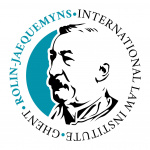Conference: 'Taming the many-headed monster? Secondary Sanctions in the International Legal Order'
Call for abstracts
On Thursday 2 and Friday 3 December 2021, the Ghent Rolin-Jaequemyns International Law Institute (GRILI) and the Utrecht Centre for Regulation and Enforcement in Europe (RENFORCE) will host a two-day international conference on secondary sanctions. The conference seeks to explore both the international legal framework governing such sanctions and the potential remedies to challenge them, as well as how these measures may shape the international legal order. The conference will feature separate panels devoted to discuss the impact of secondary sanctions; their compatibility with the law of jurisdiction and international economic law, and; to commercial practices and domestic litigation pertaining to secondary sanctions. A final panel will offer an outlook for the future, having regard, for instance, to the preparation of an EU ‘anti-coercion instrument’. In addition, the organizers are inviting promising legal scholars in an earlier stage of their academic career to submit an abstract to participate in a panel dedicated to ‘emerging voices’.
Possible topics include, but are not limited to:
- specific sanctions regimes, e.g. the re-imposition of US sanctions against Iran, the NordStream2 sanctions, or Title III of the Helms-Burton Act;
- specific proceedings at the international, regional or national level (e.g. the 1955 Treaty of Amity case (ICJ); the Bank Melli case (CJEU); or the Meng Wanzhou case (Canada));
- the international legality of re-exportation restrictions based on the origin of certain goods;
- extradition proceedings in connection with breaches of secondary sanctions;
- the enforcement of the EU Blocking Statute;
- secondary sanctions’ impact on inter-state relations, their compatibility with the principles that govern the international legal order; etc.
Critical and interdisciplinary approaches to secondary sanctions are also welcome. Interested participants are invited to take a closer look at the provisional conference programme (attached) to limit overlap with other panels/speakers. Abstracts are due by 30 June 2021 and should be accompanied by a brief curriculum. Applicants will be informed of the outcome by 31 July 2021, while full papers are due by 15 November 2021. Subject to peer review, the selected papers will be included in an edited volume to appear in 2022/23.
For more information, including possible travel and accomodation funding, see the attached PDF file.

